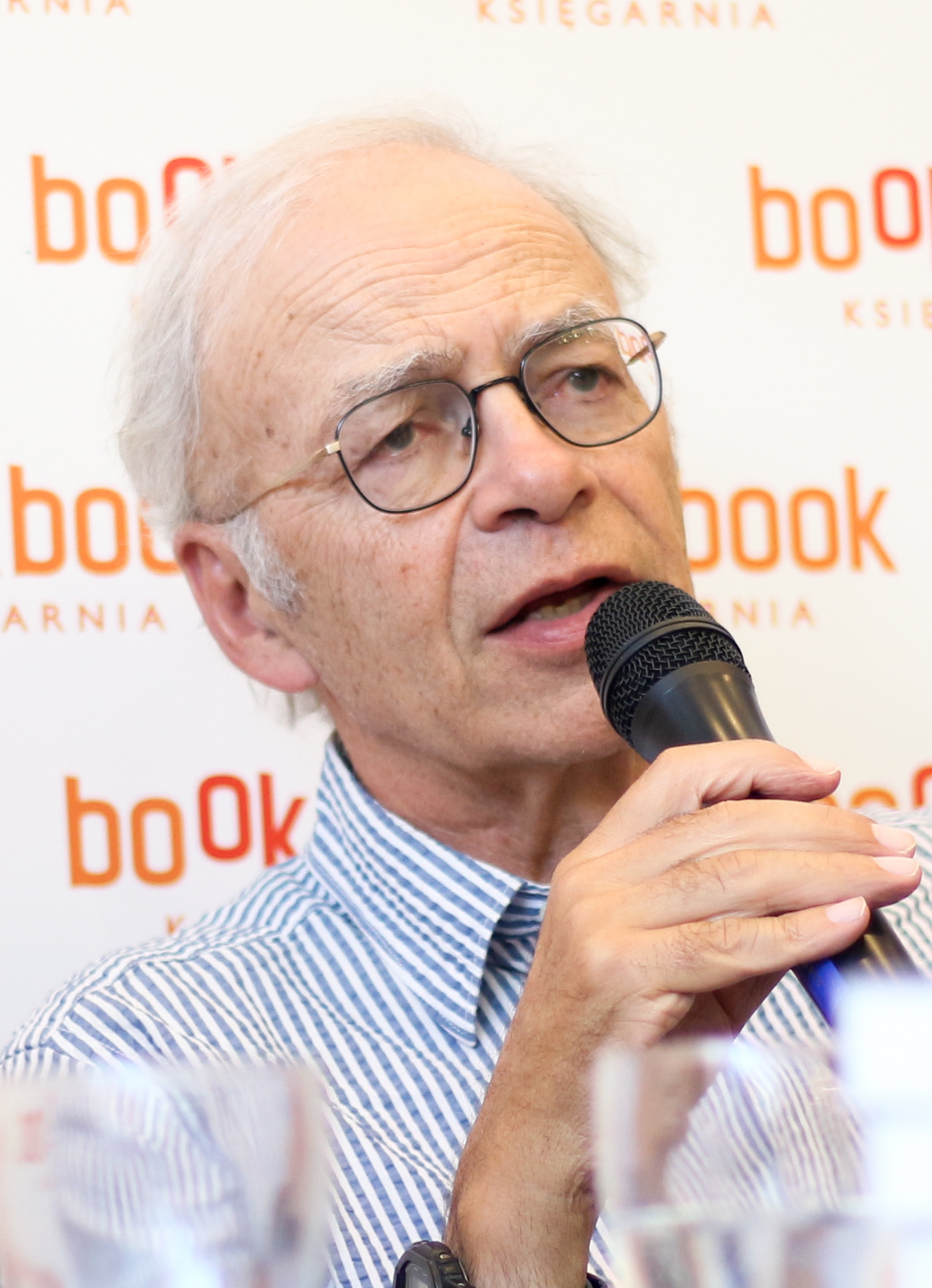
Peter Singer
Peter Albert David Singer AC (born 6 July 1946) is an Australian moral philosopher who is Emeritus Ira W. DeCamp Professor of Bioethics at Princeton University. Singer's work specialises in applied ethics, approaching the subject from a secular, utilitarian perspective. He wrote the book Animal Liberation (1975), in which he argues for vegetarianism, and the essay "Famine, Affluence, and Morality", which argues the moral imperative of donating to help the poor around the world. For most of his career, he was a preference utilitarian, but he revealed in The Point of View of the Universe (2014), coauthored with Katarzyna de Lazari-Radek, that he had become a hedonistic utilitarian.
For other people named Peter Singer, see Peter Singer (disambiguation).
Peter Singer
- Animal Liberation (1975)
- Practical Ethics (1979)
- The Life You Can Save (2009)
3
Why Should I Be Moral? (1969)
R. M. Hare (BPhil advisor)
On two occasions, Singer served as chair of the philosophy department at Monash University, where he founded its Centre for Human Bioethics. In 1996 he stood unsuccessfully as a Greens candidate for the Australian Senate. In 2004 Singer was recognised as the Australian Humanist of the Year by the Council of Australian Humanist Societies. In 2005, The Sydney Morning Herald placed him among Australia's ten most influential public intellectuals.[3] Singer is a cofounder of Animals Australia and the founder of the non-profit organization The Life You Can Save.[4]
Academic career[edit]
After spending three years as a Radcliffe lecturer at University College, Oxford, he was a visiting professor at New York University for 16 months. In 1977 he returned to Melbourne where he spent most of his career, aside from appointments as visiting faculty abroad, until his move to Princeton in 1999.[22]
In June 2011 he joined the professoriate of New College of the Humanities, a private college in London, in addition to his work at Princeton.[23] Singer gave his last lecture at Princeton in 2023, and has retired.[24]
He has been a regular contributor to Project Syndicate since 2001.[25]
According to philosopher Helga Kuhse, Singer is almost certainly the best-known and most widely read of all contemporary philosophers.[26] Michael Specter wrote that Singer is among the most influential of contemporary philosophers.[27]
He co-founded the open-access Journal of Controversial Ideas along with bioethicist Francesca Minerva and moral philosopher Jeff McMahan in 2018.[28][29]
Recognition[edit]
Singer was inducted into the United States Animal Rights Hall of Fame in 2000.[99]
In June 2012, Singer was appointed a Companion of the Order of Australia (AC) for "eminent service to philosophy and bioethics as a leader of public debate and communicator of ideas in the areas of global poverty, animal welfare and the human condition."[100]
Singer received Philosophy Now's 2016 Award for Contributions in the Fight Against Stupidity for his efforts "to disturb the comfortable complacency with which many of us habitually ignore the desperate needs of others ... particularly for this work as it relates to the Effective Altruism movement."[101]
In 2018, Singer was cited in the book Rescuing Ladybugs by author and animal advocate Jennifer Skiff as a "hero among heroes in the world" who, in arguing against speciesism "gave the modern world permission to believe what we innately know – that animals are sentient and that we have a moral obligation not to exploit or mistreat them."[102]: 132 The book states that Singer's "moral philosophy on animal equality was sparked when he asked a fellow student at Oxford University a simple question about his eating habits."[102]
In 2021, Singer was awarded the US$1-million Berggruen Prize,[103] and decided to give it away.
He decided, in particular, to give half of the prize money to his foundation The Life You Can Save, because "over the last three years, each dollar spent by it generated an average of $17 in donations for its recommended nonprofits". (He added he has never taken money for personal use from the organisation.)
Moreover, he plans to donate more than a third of the money to organisations combating intensive animal farming, and recommended as effective by Animal Charity Evaluators.[104]
For 2022 Singer received the BBVA Foundation Frontiers of Knowledge Award in the category of "Humanities and Social Sciences".[105]
Personal life[edit]
Since 1968, he has been married to Renata Singer (née Diamond; b. 1947 Wałbrzych, Poland); they have three children: Ruth, a textile artist; Marion, law student and youth arts specialist; and Esther, linguist and teacher. Renata Singer is a novelist and author and has collaborated on publications with her husband.[106] Until 2021 she was President of the Kadimah Jewish Cultural Centre and National Library in Melbourne.[107]